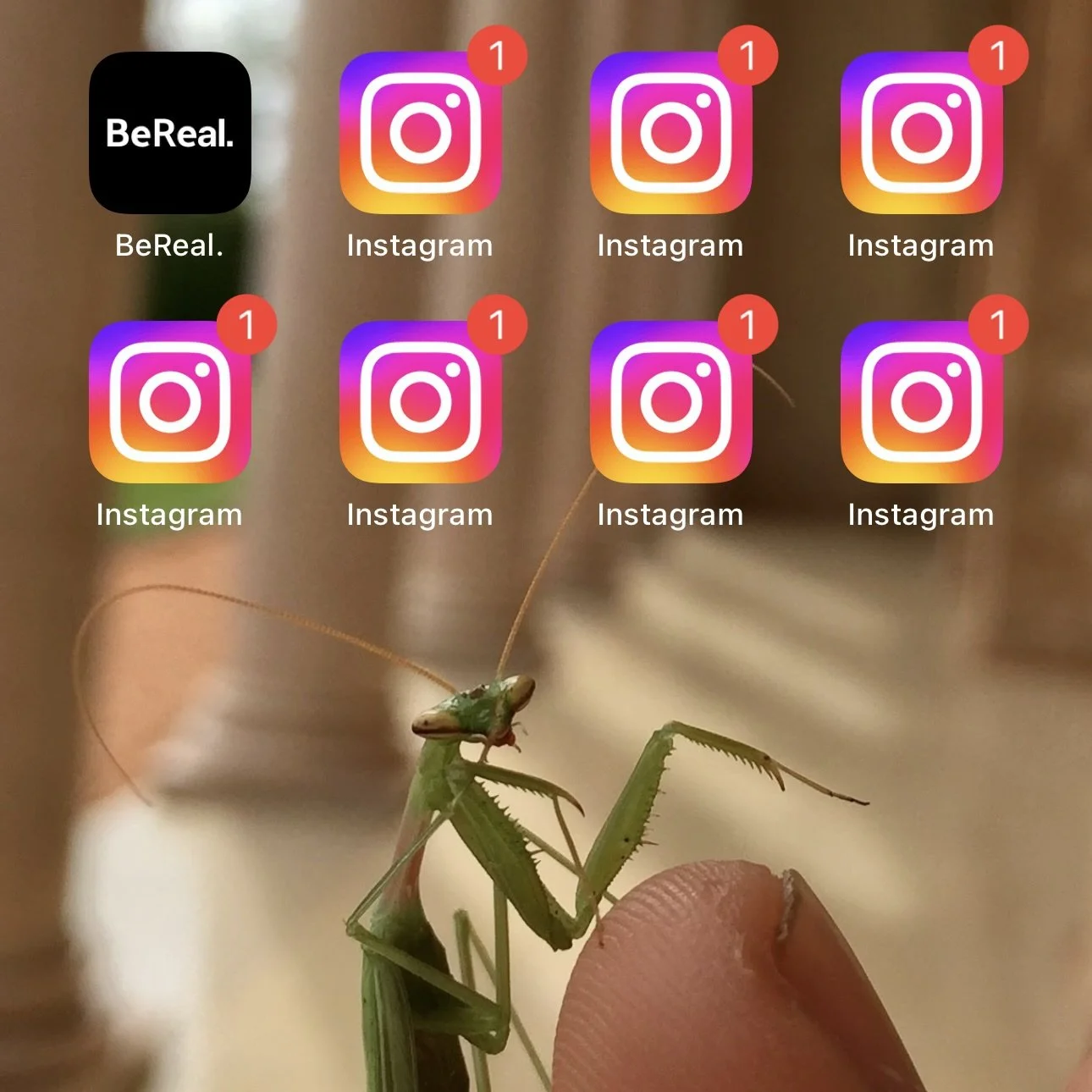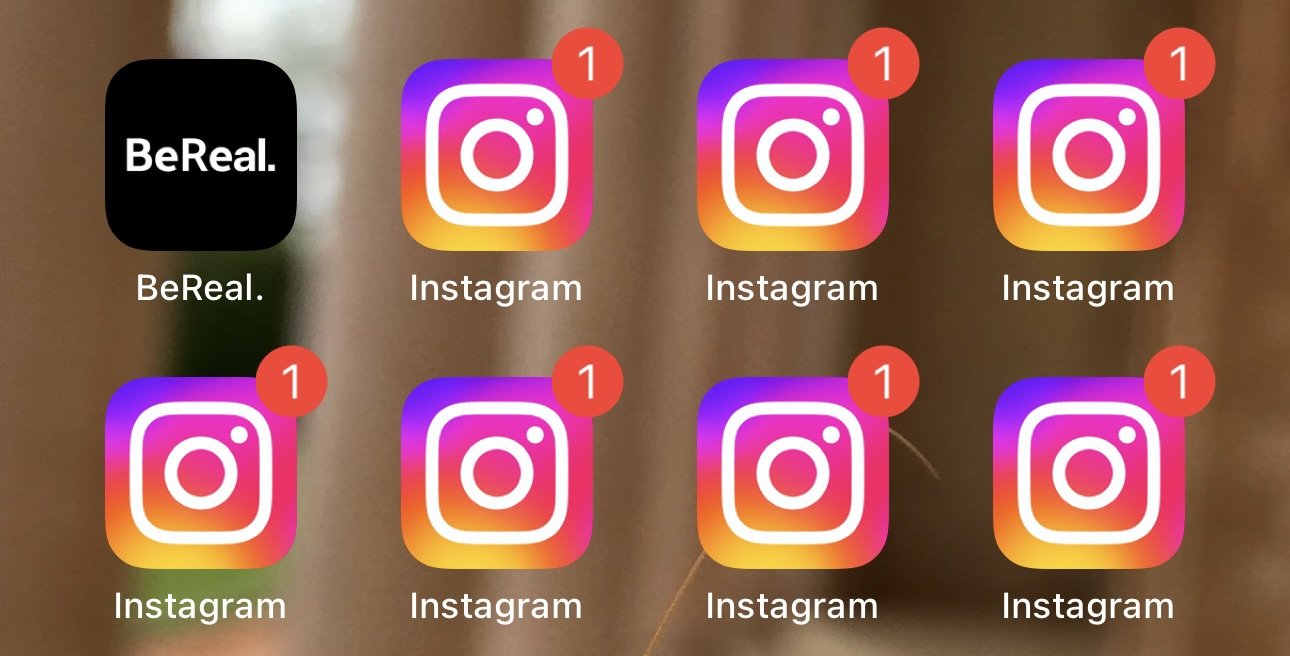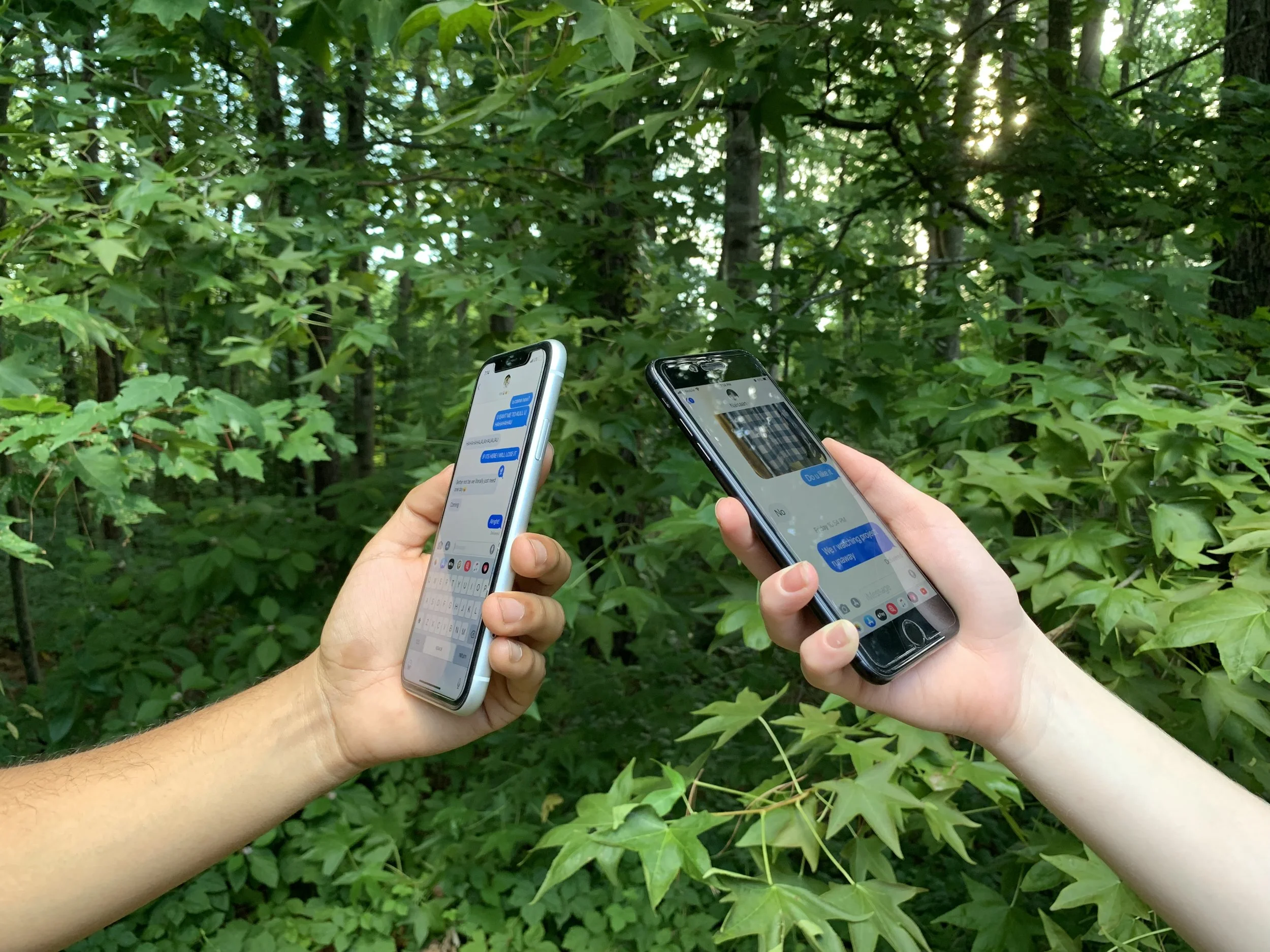Can BeReal’s Pure Intensions Make it Profitable?
Audio Narrations of each article found on Apple Podcasts, Spotify, or wherever you get your Podcasts
I was wrong about BeReal. In late 2022 I predicted that the social network BeReal would have the same fate as other social apps like Vine and House Party. Apps that were fun and new for a time, but then faded into oblivion. After using BeReal for a year now, I understand why BeReal has a bit of a cult following and why it could have the legs to stick around; if it can find a way to be profitable that is.
What is BeReal?
For those who don’t know, BeReal is a new social network that positions itself as a social network for people who hate social networks. BeReal is based on the premise that on every other social network (cough cough Instagram), people only post the best parts of their life, leaving the impression that if you’re not doing something interesting, or always out with friends 24/7, your life is somehow less than. When in reality if everyone posted mundane moments we’d all realize how performative social media becomes. Social Networks are designed for people to spend as much time on them as possible and thus become addicted to them, wasting hours mindlessly scrolling. BeReal turns all of this upside-down by flipping the incentives of Social Media. Instead of posting all the cool performative moments, BeReal incentivizes you to post more mundane and average moments. It does this by choosing a random time throughout the day and telling everyone on BeReal to post what they’re doing in that moment. Sure you could post any moment throughout your day to BeReal, but then you’d be considered “late” and BeReal puts stat under your post to show how “late” you were to posting compared to the random BeReal time the app chose for everyone; thus incentivizing you to post when the app says “It’s Time To BeReal”. Unlike other social media networks, besides the main feed where you view what your friends were doing when it was BeReal time, there isn’t much else to the app, and that’s the point. 1
What Separates BeReal from Other Social Media Apps?
A common theme on my blog is that by understanding the incentives any given company has, you can understand why they operate in the way they do. For social media apps like TikTok or Instagram, their incentive is to keep you on the app as long as possible so that they can monetize your time through ads. When you turn back the clock, all modern social media apps started off as a beautiful execution of a simple idea. Before Instagram was acquired by Facebook, it started off as a simple place to post your single best photo of any day or night. It was simple compared to Facebook which allowed you to post anything under the sun from random statuses to every photo on your phone. After Instagram was acquired by Facebook its incentives changed, the longer it kept you in the app the more it could show you ads and sell your interests to advertisers to target you with hyper-specific ads. In order to further monopolize your time, Facebook shoved as many cheap knockoffs of other social media apps as possible into Instagram. The idea being, that if they could reduce the reason to check/use other apps more of your time would be spent on Instagram. A far more malicious expression of this desire to keep you using the app for as long as possible is by showing you “engaging” content. On the surface engaging content sounds fine, who wouldn’t want to consume engaging content? But taking into account Facebook’s incentive to keep you using the app, their definition of engaging content is where the toxicity begins. Content designed to keep you on the app can often become enraging and designed to provoke a reaction, leaving any attempt at truth behind. It can be content promoting unrealistic body images being constantly resurfaced by an algorithm incentivized to keep people using the app. It could be content designed to promote unhealthy lifestyles, giving a false impression that everyone else is doing it. It could be… well I could go on and on about how Facebook’s incentives lead to unmatched levels of toxicity, but maybe that’s for another article. For now, I think it’s important to contrast the status quo of social media with BeReal.
Compared to Facebook’s slanted incentives which favor Facebook, BeReal’s incentives remain more or less in line with its users. There isn’t any sort of endless feed designed to echo your desires back at you to keep you on the app nor is really much to do on BeReal besides posting and interacting with friend’s posts. BeReal’s unique post-at-the-same-time-as-everyone-else mechanism is designed to get you in and out of the app not trick you into spending hours scrolling. There is no algorithm recommending you things, all posts are in chronological order, and the User Interface is very clear when you’ve reached the end of your feed. Intriguingly, BeReal’s founder and CEO Alexis Barreyat has publicly stated that he doesn’t want to insert ads into the BeReal experience. This is more or less a proclamation that Barreyat does not want BeReal’s incentives to change. So for now, BeReal’s intentions remain pure.
How Will BeReal Ever Make Money?
Eventually, BeReal will have to attempt to turn a profit. Like many start-ups, BeReal is currently staying afloat with venture capitalist money. Since BeReal isn’t a non-profit, or a Beyond Profit (putting the company’s mission ahead of making money), its end goal is to be profitable. So if Barreyat doesn’t want to change his company’s incentives and insert ads, how should BeReal navigate its need for profitability?
A Subscription Model?
Many have speculated that if BeReal is to make money, it would need to charge its users a subscription fee for using the app. That way BeReal would have reoccurring revenue for its most loyal users. The question remains, who would continue using BeReal if a subscription was required? Even if the subscription was $9.99 a year, I think a plurality of BeReal’s user base would simply stop using the app. BeReal then runs the risk of having the entire social network collapse because why pay for a yearly subscription if even half of your friends (I’m being generous here) have completely left the app? I personally wouldn’t mind paying a subscription to use a social media app I acknowledge that I’m in a small minority of people who would even consider it. 2 Regardless, monetization via subscription would keep BeReal’s pure incentives intact as there would be no need to incentivize the same addictive behaviors as other social media apps. I just don’t think a subscription would ever be a viable solution.
Rethinking Ads?
Although the first half of this article talked about my overall disdain for the incentives an ad-based social media platform creates I don’t necessarily think that all advertisements are bad. Businesses will always need ways of getting in front of consumers and digital ads are a great way to do that. (Disclosure: At the time of publishing, I am employed by an Ad Tech Company that makes its money from running ads on different social media platforms. My job will never affect my written work nor should my written work reflect the opinion of my company). What I’m proposing is an ad-based system where BeReal can keep its pro-user incentives in line while not needing to push users to stay in the app longer than they need to. The way I’d go about this is to have one ad at the top of the app. Instead of being in a race to cram as many ads as possible into the app, the prominent and exclusive placement at the top of the app would mean this ad would fetch a hefty premium. BeReal by design is meant to be opened daily at randomly chosen times when it’s Time to BeReal. BeReal could give advertisers access to these “random BeReal times” to make ads even more temporally relevant. Imagine a food company buying an ad when a BeReal time happens before dinner. Or another company does a promotional giveaway only for the people who post their BeReal on time. The unknown aspect of who will be sponsoring a BeReal could even further incentivize people to post on time to reap the potential rewards. An exclusive advertising spot for the Millennial and Gen Z demographics could prove to be incredibly valuable.
BeReal Events?
A big critique of Social Media as a whole is that it is incredibly isolating. Besides the negative aspects outlined above, social media is inherently consumed alone. BeReal combats this by incentivizing in-the-moment posts, but what if it could go further? BeReal Events could be in-person experiences designed to promote community and bring people together who would have never met before. Third Places (Places outside of Home or Work where people can hang out without paying) are on the decline but are desperately desired by many including myself. Although BeReal isn’t creating permanent Third Places, by partnering with local businesses BeReal can temporarily create third places, promoting togetherness and community. Staying on brand, BeReal could even have a geo-locked BeReal just for the people at the event, and they could promote the event in the BeReal app. BeReal’s path towards Event profitability would be multifaceted. BeReal could charge businesses to have an event-specific BeReal and to be locally promoted in the BeReal app. BeReal could partner with a larger chain like Dutch Bros or Cava and take a percentage of the food revenue during the time of the event. Once BeReal Events becomes fully established BeReal could turn into a sought-after spot to advertise events unlocking more monetization opportunities. A BeReal Sponsored Concert could have a similar business model with local and national artists performing at smaller venues and sharing the profit with BeReal. Along similar lines, why limit event-based BeReals to businesses, why not allow people to create their own BeReal Events? A birthday party could have a group chat, an event page where people could RSVP, and an event-specific BeReal all from the BeReal app.
BeReal Hardware Product?
Of all my ideas to drive profit for BeReal, the idea of BeReal building a tangible product is the hardest to put into words. To start, building a product that people like and want to buy is incredibly hard, yet this business opportunity is in line with BeReal’s incentives if done right. The incentives behind building a product are pretty simple, build a product that people want to buy, sell it, and get money. A BeReal hardware device could be designed to further promote BeReal’s be-in-the-moment values. They could do this by building a Polaroid-type camera that takes a limited number of pictures (and of course BeReals) which would then be sent to you in the mail days later, printed on some nice artsy photo paper designed to be hung up. BeReal could make a necklace that lights up when you receive a notification from someone or something you deem worthy. BeReal could even be risky and bet the entire company on making a phone that would be designed to keep you in the moment by only letting you send texts, receive calls, and of course take photos and BeReals. Are any of these good ideas? I’d like to think so, but could any of these sell in large enough numbers to sustain BeReal? Unclear. What I do know is that there’s something to the idea of having a piece of technology that is designed to help you remove yourself from other pieces of technology.
Final Thoughts
I can’t help but root for BeReal. It feels like for the first time in a long time, there’s a social network whose incentives are aligned with its users. BeReal’s decision to, for now, forgo sticking ads everywhere in its app and thus change its incentives is incredibly admirable. But will this decision help drive profit, or will it haunt BeReal in the long run? I’m honestly not sure. At the beginning of this article, I mentioned apps like Vine and House Party that faded into oblivion, and unfortunately, there’s still time in BeReal’s story for this conclusion to become a reality. But maybe BeReal is different. Maybe a social network designed to be used less often will withstand the tests of time. And maybe, just maybe, BeReal will become a haven for those who want to disconnect from toxic social media and just have fun with friends. Having pure intentions is great, but to become profitable, BeReal will have to walk a tightrope between keeping its promise to its users and finding creative pathways toward financial success.
1 Sure all your friends opening the app at the same time when BeReal tells you it’s time to post might seem dystopian, but I’d argue that using social media to the point where you lose track of time is much more dystopian.
2 I already paid for a subscription to a social media app called Ivory. It’s a client for the federated social network Mastodon. Despite being $15 a year, I’m willing to pay the subscription because it’s one of my all-time favorite apps and because it moves the incentives of a social media app more in my favor. By paying for a subscription the developers of Ivory are incentivized to continuously improve the app because if I the user stop liking it, I just won’t renew my subscription.





